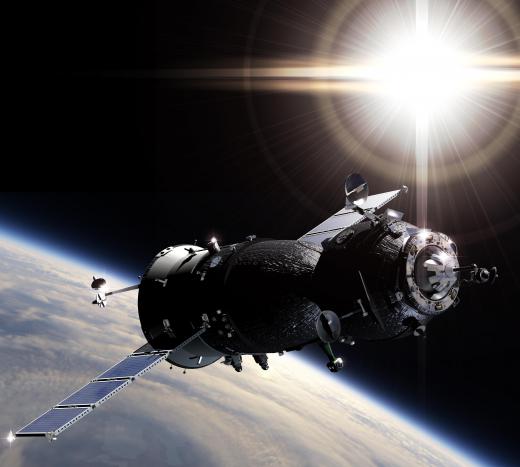What is Cosmic Radiation?
Cosmic radiation, often referred to as cosmic microwave background radiation, is a form of electromagnetic radiation that exists throughout the entire universe. Cosmic radiation is one of the major sources of background radiation on earth. Background radiation is radiation that is constantly present in the environment; it can originate from natural sources such as radon gas and from man-made sources such as nuclear power plants. Cosmic background radiation is specifically radiation present in the environment that originated from the sun and from other sources in space. Such radiation is composed of many different kinds of charged and uncharged particles; many of the particles that reach earth are formed when radiation from space interacts with particles in the atmosphere.
Most of the cosmic radiation that reaches the Earth is shielded by the atmosphere. Many high-energy particles that could be harmful to organisms on Earth impact particles in the atmosphere; the collision of these particles greatly decreases their energy. As such, they are considerably less dangerous and can not significantly harm organisms on the Earth's surface. Some human activities damage the atmosphere, however; some chemicals humans use, for example, can damage the ozone layer which plays a vital role in blocking out harmful ultraviolet cosmic radiation.

Ultraviolet cosmic radiation tends to be the most dangerous form of cosmic radiation; it is high-energy radiation that comes from the sun. Limited exposure to ultraviolet light is important to health as it causes the human body to develop vitamin D, which is important to many body processes, such as immunity and blood pressure regulation. Excessive exposure to ultraviolet radiation, however, can lead to sunburn and can severely harm the skin's genetic information by damaging the DNA contained within skin cells. This can lead to several different forms of skin cancer, which is extremely dangerous and can be fatal. Excessive exposure to ultraviolet radiation can be caused simply by spending too much time in the sun.

Cosmic radiation levels tend to increase with increasing altitudes, so those who fly with great frequency can sometimes receive unhealthy doses of radiation. Most casual travelers do not need to worry about this, but full-time flight crews and pilots occasionally suffer from radiation exposure. The precise amount of damage that altitude-related exposure can cause is not yet fully known. The World Health Organization, however, advises that air crews and frequent fliers keep themselves aware of health effects of cosmic radiation. They also recommend that pregnant women record their radiation doses and ensure they do not reach any harmful levels.
AS FEATURED ON:
AS FEATURED ON:















Discussion Comments
@Charred - Pilots get hit hard with that stuff. I read somewhere that they get the equivalent of one X-ray for every few hours in flight. Consider the fact that many pilots log hundreds of thousands of hours in flight time and you know the risks they take to fly. I’ve heard that pilots in Europe usually die from cancer. Pilots certainly have a lot more to worry about than the passengers who are up in a tizzy over the tiny bits of radiation they get from body scanners. It’s something to think about if you plan on becoming a commercial pilot.
@Charred – My first encounter with cosmic radiation was not in space but in Florida. I went out to the beach one summer and didn’t put on any lotion. My face and body were so burned that my skin was peeling. It looked like I had skin cancer, but thankfully I didn’t. That was my lesson learned. Those ultraviolet cosmic rays can really hurt you if you’re not careful.
Cosmic radiation is powerful stuff indeed. Now you know why astronauts have to wear so much protection when they go out into space. Those gold visors you see them wearing are not just fancy sunglasses. They provide some heavy-duty cosmic radiation shielding so the astronauts don’t get blinded by the sun--or worse, get cancer.
Cosmic radiation is sort of the signature of the universe. That’s why SETI has been probing the night skies for years listening in on galactic cosmic radiation signals. The idea is that if aliens ever wanted to communicate with us then they would be using these signals in one way or another.
I watched one show where some lady who worked at SETI said she thought she had picked up a unique signal from what she thought was an extraterrestrial civilization. The problem was she heard the signal only once and never heard it again.
Given the importance of SETI and what it’s doing, it’s a crying shame that SETI is getting hit with budget cutbacks. It’s an important program and one that we should keep going for a long time.
Post your comments